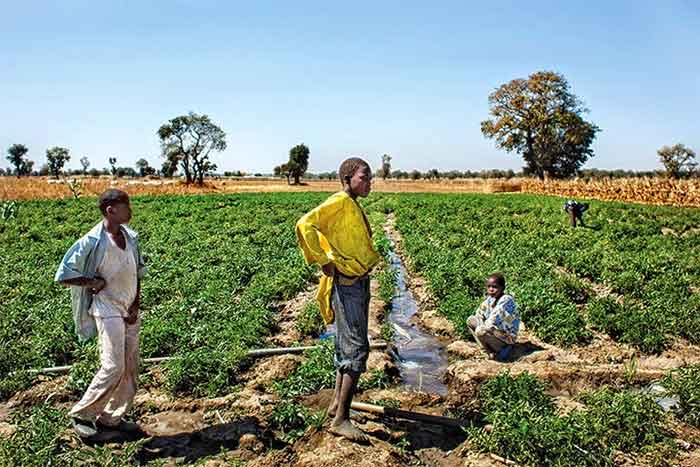
In 2012, Nigeria was amidst a social and political crisis when Kola Masha, the Harvard educated managing partner of Babban Gona, the award-winning for-profit social enterprise, took a monumental decision to leave United States and return to his native village in Northern Nigeria. The nation had witnessed three insurgencies, The Boko Haram, Niger Delta Crisis, and the Fulani Herdsman attacks, risking a volatile society teetering on the brink of anarchy and civil war. All these armed unrests had one thing in common, youth were massively recruited and radicalized as they adorned the vanguard of these extremist groups. Insecurity and uncertainty of future were driving these disillusioned youths into violence, bombings, and bloodshed, killing innocents, unleashing mayhem, and disrupting the social fabric. The demographics of Nigeria paint a grim picture. More than 60% of the population are aged 25 years or younger, and an estimated 4-5 million youth enter the labor market annually. In 2012, youth unemployment had plummeted to a dismal 54%. It was against this backdrop of disenchanted, aggressive, and belligerent youth, Kola Masha conceived his revolutionary idea, Babban Gona.
OVERVIEW OF AGRICULTURE SECTOR IN NIGERIA
Babban Gona in native Hausa language means ‘The Great Farm’. Nigeria’s agricultural output is heavily dependent on small holder farmers who owns less than a hectare of land. The approximately 38 million small-horders produce an estimated 70% of the country’s $102 billion farm output. Agriculture constitutes around 24% of GDP and 70% of the population engages in the sector, albeit on a subsistence level. The farmers were stuck in poverty for generations due to an economic problem of low economies of scale, owing to smaller land holdings. Rice and Maize were the main crops and cultivation had become unsustainable, robbing millions of their livelihoods and farming communities, especially the disenchanted youths abandoning it altogether and were migrating to greener pastures in urban and semi-urban locations. Despite the underpinnings of huge downside risks of agricultural sector, Kola Masha found great potential to revive this sector and this conviction helped him launch Babban Gona in 2012, whose primary objective ever since its inception, is to convince the youth that their fortunes could be restored by embracing agriculture through scientific methods.
BABBAN GONA BUSINESS MODEL
The core philosophy of Babban Gona is centered on creating farming cooperatives by organizing small holder farmers, consolidating into a functional value chain of a big farm network. These participating farm holders are accorded co-ownership rights of Babban Gona through a franchisee agreement and receive customized end-to-end solutions. There are sequential processes in the operating model, the preliminary step being identification of future leaders, especially youth, and their leadership potential is assessed through a series of psychometric tests. Once selected, these candidates undergo rigorous training and guidance from Babban Gona to reconfigure their mindset from subsistence income farming to developing into a commercially feasible and positive net-income, for-profit enterprise. By acquiring professional management skills, these farmers transition as entrepreneurs and share a collective responsibility of social impact through their financially viable cooperatives.

The second step is to advance credit facilities that are combinations of cash and kind. The participating farmers can avail agricultural inputs in the form of disease-resistant and high yielding varieties of seeds and fertilizers that minimizes labor engagement, causing a direct reduction of working capital costs. The members also receive a $1000 financial credit, with limited collateral and is often against the crop in the field. Babban Gona employs dedicated agro-experts who oversee the entire crop cycle, make visits to each individual farm every 2 to 4 weeks the entire season, conducts farm analysis and offers technical counsel. To streamline these periodic visits, Babban Gona boasts of the largest motorcycle fleet in Nigeria. The organization has developed state-of-the-art Artificial Intelligence and Machine Learning algorithms that does predictive analytics on weather patterns, pestilence, chlorophyll levels on leaves and these data accessible to the farm supervisors on a mobile application.
Prior to harvesting, each farm owner is even provided with an adequate supply of empty bags, needles, and threads. Post-harvesting, the produce is deposited in about 50 company owned collection centers across Nigeria that has more than 150 metric tons of storage capacity in optimal conditions. Babban Gona does all the marketing activities on behalf of the farmers for a period of 9 months and have long-term strategic tie-ups for procurement with MNC’s like Nestle. The profits from the sale transactions are distributed to each member farm-holders as dividend payouts every quarter.
THE SUCCESS STORY
The results are staggering. The yields per hectare have doubled the national figures and the average income per household has risen to more than 2X, the national average. The productivity gains in using high yielding seeds in small farms are massive; more than 40% of the farms have attained 5 tons per hectare for maize and Babban Gona cooperative network is now the largest producer of maize in Nigeria. Currently, there are over 6000 Babban Gona mini cooperatives in the country and the affiliated individual members have swelled to more than 81,000 in the last 8 years. According to a Babban Gona 2021 Annual Report, 400,000+ jobs are created since inception,, more than 350,000 acres sustainably farmed by smallholder landowners and about 900,000 individuals in local communities impacted. They have ambitious expansion plans of targeting 1 million farmers, by leveraging sustainable strategic programs, that by 2025, will impact 5 million people, having access to healthy food. Of the 360,000 profitable loans that have been disbursed till date, the repayment rate is 99.9%, which also attracts, hundreds of impact investors. Babban Gona aims to create 10 million jobs in the country by 2030.
This is a stupendous turnaround for an average small holder farmer, who had no financial history, zero credit worthiness, devoid of a bank account, no land titles and therefore no bank borrowings to finance a low value commodity within a loose value chain. Babban Gona changed all that and have since revolutionized the agricultural sector. The most promising aspect of this resounding success is that Nigerian youth are becoming increasingly attracted to farming as a vocation. The organization is inundated with applications for new memberships from young prospective farmers below the age of 25, who are convinced of the financial prospects and ensuing quality life that their legacy farm holding could now offer.
Kola Masha envisages similar potential for opportunity and emulate Babban Gona success to the entire African continent. Soliciting an ambitious investment outlay of 150 billion USD from the global investor community and capital markets, Kola Masha is optimistic on providing gainful employment to around 200 million Africans, who will enter the agricultural sector in the next 20 years. Babban Gona is a profitable and scalable model that could be replicated in the emerging markets of the world, where systemic risks and structural problems plague agricultural sector. By harnessing the power of technology, professional management, and investment to scale, Babban Gona leads the agricultural renaissance in Nigeria.
Jayakhosh Chidambaran is a management consultant and researcher.















































